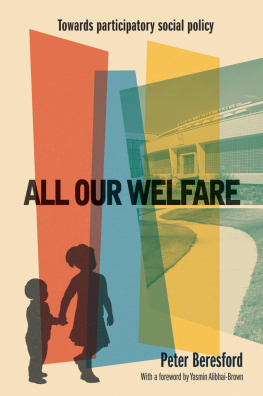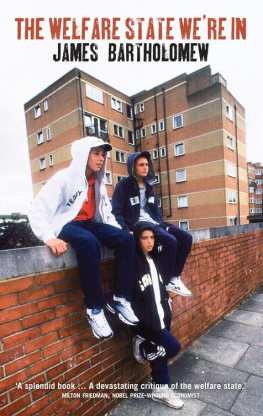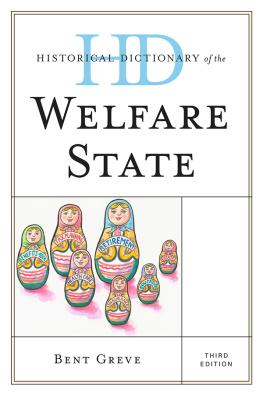First published 2000 by Ashgate Publishing
Reissued 2018 by Routledge
2 Park Square, Milton Park, Abingdon, Oxon OX14 4RN
711 Third Avenue, New York, NY 10017, USA
Routledge is an imprint of the Taylor & Francis Group, an informa business
Copyright Tom Burden, Charlie Cooper and Steph Petrie 2000
All rights reserved. No part of this book may be reprinted or reproduced or utilised in any form or by any electronic, mechanical, or other means, now known or hereafter invented, including photocopying and recording, or in any information storage or retrieval system, without permission in writing from the publishers.
Notice:
Product or corporate names may be trademarks or registered trademarks, and are used only for identification and explanation without intent to infringe.
Publishers Note
The publisher has gone to great lengths to ensure the quality of this reprint but points out that some imperfections in the original copies may be apparent.
Disclaimer
The publisher has made every effort to trace copyright holders and welcomes correspondence from those they have been unable to contact.
A Library of Congress record exists under LC control number: 1840143878
ISBN 13: 978-1-138-73732-7 (hbk)
ISBN 13: 978-1-315-18549-1 (ebk)
Introduction
The 1997 General Election marked the prospect for a new epoch in British social policy. The British electorate, in thrall for so long to the 'neo-liberal' project of the Conservatives, followed trends elsewhere in Europe in the late 1990s and voted decisively for a new 'centre-left' government. Labour's landslide election victory was the largest in its history. According to some commentators, this turning point offered possibilities for establishing a 'third phase' in the post-war history of the welfare state (the first being the creation of the Keynesian welfare state, the second being the neo-liberal reforms of the 1980s and 1990s). The exultation that greeted Tony Blair's entrance to Downing Street on the morning of 2 May 1997 seemed to represent an extraordinarily deep-rooted sense of relief, shared throughout the nation, as if a huge dark cloud had lifted. Both The Observer (4 May 1997) and New Statesman (May 1997 Election Special), echoing Blair's own pronouncement, proclaimed Labour's victory as heralding the dawn of a 'new era'. This book critically explores this proclamation and considers the reality of, and options for, a new era of social welfare in Britain under New Labour.
The welfare state that the Labour government inherited from the Conservatives was in a critical condition. The National Health Service (NHS) was under strain due to a combination of an ageing population, increasing demand for new and expensive medical technology, and underfunding. The education system was facing numerous difficulties such as increasing school exclusions (even among primary-age children), decaying buildings and poor equipment, and an increasing sense of demoralisation amongst teachers. The nation's housing stock was falling into increasing disrepair; housing affordability, homelessness and rooflessness had become problems for increasing numbers of people. Social inequality was widening, and around one in four children lived below the poverty line. The 'family', increasingly expected to meet the demands of care in the community, faced intense pressures brought about by cut-backs in social services, longer working hours, the risks and fears of unemployment, and poverty. Welfare institutions, no longer able to cope with inequality and ensure access to essential services, had become overseers of a rationed, substandard, residualised service. Social policy in Britain was unable to address these problems because of the perceived need for financial prudence forced on government by globalisation, world competition and voters resistance to tax rises.
Much of the existing material on future prospects for social welfare under New Labour tend to measure the degree to which strands in its thinking reflect 'Old' Labour or neo-liberal social values. Despite their claims to a distinct 'Third Way', provisional verdicts suggest that there is clear policy convergence in some areas between New Labour and the neo-liberals. This is reflected most notably in the continuance of public spending controls and economic prudence, limits to state intervention, welfare to work, voluntarism, and quasi-markets in welfare (Powell 1999). New Labour has also been seen to embrace a particular conservative and conditional brand of communitarianism, characterised by highly moralistic and prescriptive approaches to collective responsibility. In return for collective rights, individuals are bound by duties and obligations (Driver and Martell 1998).
This book takes a different approach to evaluating future prospects for social welfare in Britain by exploring what we call the dominant discourse of welfare. By this we mean the way in which the dominant power interests within discourses construct the welfare subject as a problem to be dealt with by courses of action, created, articulated and put into practice through policy intervention. Social policy intervention is central to the way in which sense is made of our social world. Its constructs reflect and recreate power relationships in society by shaping our understanding of 'reality'. Therefore, it is essential to analyse the discourse of welfare and discursive practices in social policy intervention to fully appreciate how constructed 'abnormality' enshrined in policy enables power interests to achieve legitimacy and maintain the status quo. Discourse limits the space within which policy debates are conducted and agendas are formed, excluding the lived experience of those without power. However, discourses, by their inherent contradictions, can become sites for emancipation, constructing and reconstructing opportunities for new forms of political resistance.
Despite years of state intervention in welfare, governments remain concerned with the question of social cohesion in society, more recently expressed as social exclusion. Our assessment of New Labour's policies to tackle social exclusion leads us to conclude that they are not going to lead to a more inclusive society because they inhabit a policy framework set within the same discourse of welfare that underpinned the policies of Old Labour and the neo-liberals. We show that welfare policies do not take account of the complexity of modern Britain in terms of social diversity and difference. Indeed, we share the view of Hayek in this respect in that governments cannot know enough to plan society according to some grand scheme, since no conceivable plan can truly reflect the complexity of human diversity (Hayek 1975). Because of this, welfare provision is failing to meet the needs and wants of those groups who fail to fit the model of the normalised family central to the policies of both the neo-liberals and New Labour. Social relationships in British society are not constructed around the same social values central to New Labour's agenda. In particular, we believe the language of New Labour is derived from distorted constructions about the welfare subject (defined in New Labour's policies as those likely to become dependent on welfare if not forced to enter the world of 'work').












